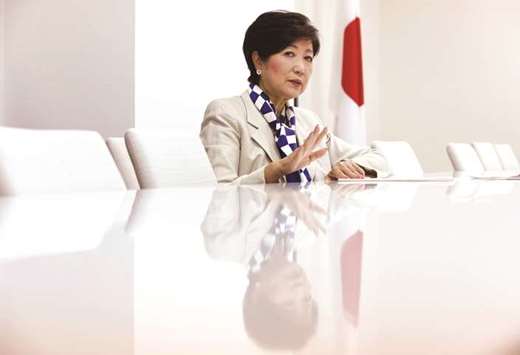Tokyo Governor Yuriko Koike, whose new conservative party is challenging Japan’s ruling bloc in an October 22 election, said yesterday she would not visit the controversial Yasukuni Shrine for war dead if she ever became prime minister.
Koike, often floated as a possible first female Japanese premier, reiterated, however, that she did not intend to run in the election and said nothing would change her mind. Speculation has persisted despite her repeated denials.
Asked if she hoped to become prime minister, Koike told Reuters: “My strong intention is to do my best as the governor of Tokyo, so I have not thought about that.”
Prime Minister Shinzo Abe called the lower house election in hopes his ruling bloc would keep its majority in the chamber, where it now has a two-thirds “super” majority, but Koike’s fledgling Party of Hope has clouded the outlook. Koike calls her party a “reformist, conservative party”, and many of its security and diplomatic policies echo those of Abe’s equally conservative Liberal Democratic Party (LDP).
Abe, who took office nearly five years ago, visited Yasukuni Shrine, seen by China and South Korea as a symbol of Japan’s past militarism, in December 2013. The visit sparked an outcry from Beijing and Seoul and an expression of disappointment from ally Washington and he has not gone in person since then.
Koike, 65, who has visited the shrine herself, said paying respects to war dead was common in other countries but added she would not go if she were premier based on a “comprehensive decision” balancing personal beliefs and diplomacy.
“I would refrain from that,” she said.
A former LDP member and defence minister, Koike also said there was no need for a major change in the Bank of Japan’s hyper-easy monetary policy and there should not be any sudden change under the next central bank chief. Noting that the BOJ had adopted a hyper-easy monetary policy, she added: “Unfortunately, this has not cured deflation. But I think there is no need for a big change in direction.”
Asked about desirable policy under the next BOJ governor, she said, “There will probably be parts that are an extension of current policy. If there were a sudden change, I think that would have an impact on the stock market.”
BOJ Governor Haruhiko has been the main architect of monetary policy under Abe, and his five-year term expires in April.
Koike also said, however, that there was need for bolder, speedier reforms than those carried out by the prime minister.
“In a fast-changing world, Japan’s progress is way too slow,” said Koike, who first entered parliament from a small reformist party in 1992 and later joined the LDP. She defied the LDP to run for governor last year and her novice local party won a July Tokyo assembly poll by a landslide.

Tokyo Governor Yuriko Koike, head of Japan’s Party of Hope, speaks during an interview in Tokyo, Japan.
